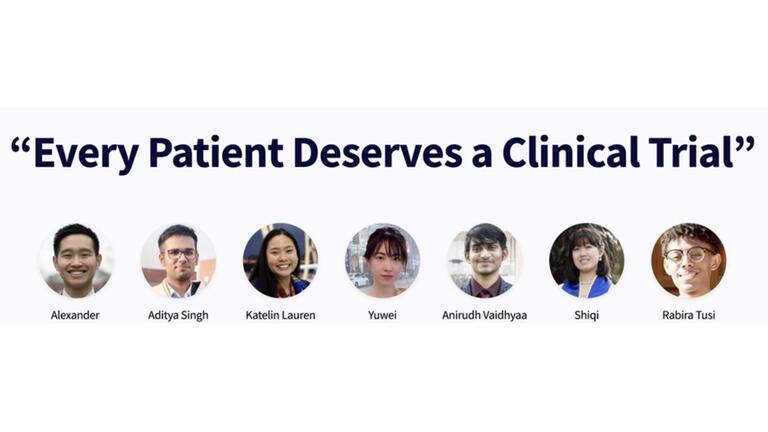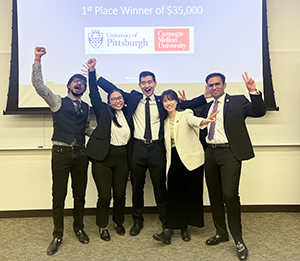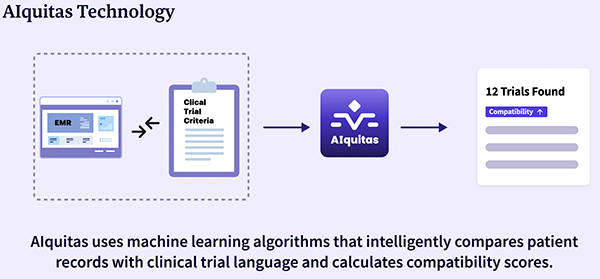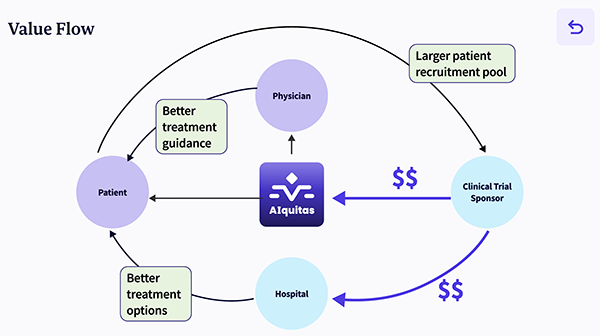CMU Team Wins First Place in the Third Coast Augmented Intelligence for Health Bowl


A team of students from Carnegie Mellon University recently placed first at the Third Coast Augmented Intelligence for Health Bowl Competition at Northwestern University this past May. “Team AIquitas,” which included Master of Design student Kate Yuwei Guo (MDes ’23), took home the first prize of $35,000 in the competition, a year-long program that involves extensive research and development of products and solutions aimed to address health disparities using AI.
The winning project, AIquitas, was designed around addressing the disparity that underrepresented minorities and marginalized populations face when trying to access potentially life-saving treatments from clinical trials.
“Clinical trial participation in the United States does not reflect the diversity of disease populations,” said Guo. “While about 43% of the US population is non-white, less than 10% of the population in clinical trials over the last 25 years were people of color. This imbalance in clinical research inclusion has been shown to result in severe limitations and biases in the collected data, with significant implications for downstream analyses, from developing therapeutic indexes to drug safety solutions, risk predictions, and toxicity estimates, resulting in poorer health outcomes for these excluded and vulnerable populations.”
AIquitas is a patient-centered clinical trial approach uses Machine Learning (ML) and Natural Language Processing (NLP) embedded in a scalable and modular digital technology platform. AIquitas parses clinical trial criteria and patient billing codes based on a healthcare common data model (CDM) standard to suggest eligible clinical trials to patients and their providers based on a calculated compatibility score. AIquitas also provides capabilities for analyzing patient demographics for any trial, allowing for explainable findings and potential improvements in trial language for clinical trial researchers and regulatory agencies.
“By focusing on streamlining patient recruitment, we continue to work on developing AIquitas into a tool that can support multiple sectors of the healthcare ecosystem, such as the pharmaceutical industry, hospitals, clinicians, patients and their families, and regulators, such as the FDA, as a clinical trial decision support tool enhanced by the latest AI and ML approaches to improve clinical trial research practices and health outcomes for patients and society,” added Guo.

Team AIquitas is a multidisciplinary team comprised of members with diverse backgrounds, with expertise spanning medical, healthcare analytics, information technology, and product design. Aside from Guo, the other team members were:
- Alexander Chih-Chieh Chang: Second-year MD-PhD student in the Pitt-CMU Medical Scientist Training Program.
- Katelin Lauren Rimando Avenir: First-year graduate student in the Master's of Healthcare Analytics and Information Technology program at Heinz College.
- Aditya Singh: Graduate Information Systems and Management graduate student at Carnegie Mellon University.
- Anirudh Vaidhyaa Venkatasubramanian: Second-year graduate student pursuing a Master's in Healthcare Analytics and Information Technology at Carnegie Mellon University.
- Shiqi Liang: First-year graduate student in Information Systems and Management, specializing in Business Intelligence & Data Analytics at Carnegie Mellon University.
“As a cross-institutional team between the University of Pittsburgh and Carnegie Mellon University, our organizations were able to reach clinical faculty ranging from surgeons to oncologists, from patients to patient advocates,” said Guo. “Carnegie Mellon University’s Heinz College Health Care Program facilitated our team assembly and introduction to our faculty mentor Dr. Padman, who helped guide us from idea generation to technological development.
The University of Pittsburgh and the University of Pittsburgh Medical Center were also instrumental in this case, as the faculty and UPMC connections provided us with crucial information that helped us form our narrative and ethos as a team. Extensive interviews with people with decades of experience in pharmaceutical development, social justice, and treating patients became the core of our success, a reminder of The University of Pittsburgh’s status as a research institution, where the polio vaccine was first invented.
“We are also grateful for their continued support as we now work to develop AIquitas as a fully-fledged feature within the UPMC ecosystem.”

On a team that contained one MD-PhD and several master’s students from Information Technology fields, Guo’s input as a designer proved to be invaluable in the development of AIquitas.
“My expertise in product thinking, problem framing, and product design allows me to contribute to the team's research and product management efforts,” said Guo. “During the research phase, I took the lead in planning and conducting stakeholder interviews, which was crucial in identifying the main target stakeholders amidst the complex landscape of clinical trials. In a problem space as vast as addressing disparities in clinical trials, there are numerous problems worth solving.
“During the product development phase, I actively challenge my teammates to evaluate our product from a user's perspective rather than solely focusing on the machine learning algorithms or technical aspects,” continued Guo. “By fostering this discussion process, we ensure that our ideas are thoroughly reviewed and avoid falling into preconceived notions or biases.”
Guo’s contribution as a designer also extended to the final presentation of the competition, by creating a prototype that effectively demonstrated the promised effectiveness and accessibility of our solution within a few minutes. This tangible representation allowed the scholars and investors on the judging panel to witness the potential of the team’s solution for future development.
Guo credits her education at the School of Design with providing her with a solid foundation in research and product thinking, which proved invaluable throughout the competition.
“Despite my passion and curiosity for design in healthcare, creating a product to aid physicians in selecting clinical trials for patients was a completely new domain for me,” said Guo. “However, thanks to my education, I could effectively understand and communicate with my teammates using design research and communication methodologies, such as contextual inquiry, stakeholder mapping, and user journey mapping.
“Additionally, the elective course I took from HCI (Human-Computer Interaction), specifically Digital Service Innovation, provided me with valuable knowledge from an entrepreneurial perspective,” added Guo. “Overall, my education in the MDes program adequately prepared me for unknown challenges. Nonetheless, design students would greatly benefit from more opportunities to collaborate with students from other disciplines in both projects and learning experiences.”
Overall, winning the competition was an “incredibly gratifying experience” for the team.
“We are filled with gratitude and pride,” said Guo. “It was significant considering the caliber of participants from prestigious schools who were MDs and PhDs. As a team of a few master's and one Ph.D. student, we distinguished ourselves by striking a successful balance between developing a cutting-edge machine-learning model, constructing a scalable business model, and designing an accessible platform. This achievement reinforced our confidence in our solution and motivated us to continue our research and product development even after the competition.
“We are excited about the potential impact our solution can have in addressing the disparities in healthcare and are eager to pursue its further growth and implementation.”